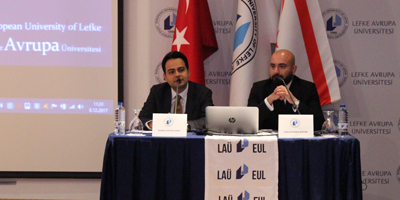“Current Affairs in the Profession of Judgeship/ Prosecution” discussed at EUL

European University of Lefke (EUL) Advancement in Law and Career Club organized a panel themed “Current Affairs in the Profession of Judgeship/ Prosecution”. Turkish Republic High Council of Judges and Prosecutors Investigation Judge Burak Gürtuğ Güney and Academician of EUL Faculty of Law Department of Administrative Law Çağlar Burak Burtan made presentations at the panel.
Merit factor has a great importance in the profession of Judgeship and Prosecution
Burtan described merit factor which is a must in choosing civil servant as being worthy of under the frame work of current affairs in the profession of judgeship and prosecution. Burtan pointed out that no distinction can be made except for qualifications, merit and competence in the selection of candidates for civil servant management. Burtan stated that in this respect, while being appointed, proceeding in the office, and advancing in the profession required principle is merit and Burtan added that by doing so the public officials who are working in public services will be able to work effectively and efficiently
Giving information about the history of merit principle Burtan stated that the Pendleton Act, adopted in the United States in 1883, constituted the first step in the transition to merit principle in the public. Burtan stated that the selection of eligible officials from the appropriate sources and candidates who have the merit principle will also ensure the acceptance of public officials who are full of character and behavioral superiority and who are acting for public weal. Burtan emphasized that knowledgeable, skillful and superior-minded public officials would not be contrary to the law because of the duty vision they possess, thereby not causing any harm to the administration.
According to the dual power practice, judges can hear cases both from civil and criminal courts.
Giving an outline of the introduction to the profession of judgeship and prosecution Güney said that the required qualifications of the candidates are stated in the 8th article of the 2820 numbered Law on Judges and Prosecutors and listed these qualifications as; being a Turkish citizen, not to have completed thirty-five years of age as of the date of entrance examination, for candidates for judicial jurisdiction; to be graduated from law school or to be graduated from a foreign law school but according to the law school programs in Turkey, entering the exams and receiving certificate of achievement for the missing lessons, not to be banned from the public rights, not to be related with military due to military service, or to be engaged in or to be deferred or retired, to be successful in the interview with a written competition examination, and not to take attitudes and behaviors that are incompatible with the profession of judgeship and prosecution.
Güney stated that the topics of written test are composed of general ability, general culture and field knowledge and added that the requirement of obtaining 70 points from the exam is removed by the relevant Delegated Legislation and that up to three times the number of quotas, the candidates can be entitled to the interview if the scores they rank among the qualified. Güney pointed out that the candidates for the interview are assessed by their power of reasoning, the general and physical appearance, the suitability and merit of their behaviors and reactions to the occupation, and their ability and culture. Güney pointed out that 70% of the written exam score and 30% of the interview score are used to determine the score and in the list which starts from the candidate who scores the highest are entitled to start the judge / prosecutor’s internship by being accepted as successful. Güney stated that the duration of the internship is 2 years and that he has gone down 1 year for 5 years with the issued delegated legislation.
Güney stated that, as a rule they have to work in every filed for certain periods, and in courts where there is no specialization, according to the dual power practice, judges can hear cases both from civil and criminal courts. Güney listed the values that should be possessed by judges and prosecutors under the framework of the Bangalore Principles of Judicial Conduct as; independence, impartiality, truthfulness, honesty, equality, competence and merit.
